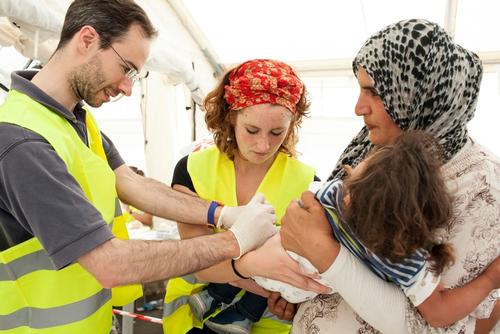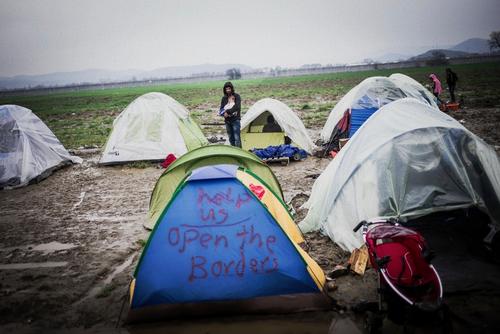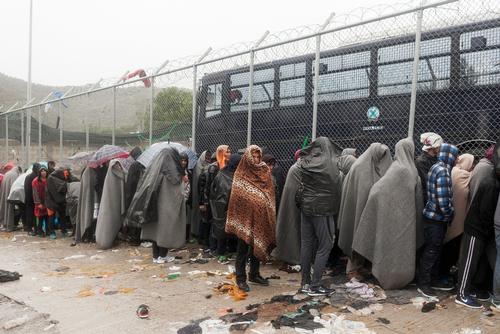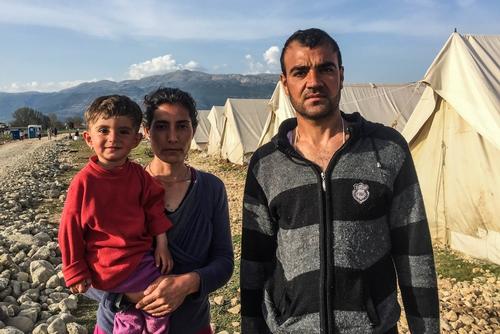Almost a month after the signing of the EU-Turkey deal, the situation across Greece remains chaotic and inhumane. Around 50,000 people are stranded in appalling conditions in improvised camps and detention centres across the country. In what is becoming unbearable heat, many are unable to access the asylum system and are rapidly losing hope that they will be able to join their relatives or find a place to live in peace.
The 10,000 people trapped at Idomeni must not pay for Europe’s poor policy with their health
In Idomeni, following the closure of the Balkans route to Europe, thousands are stranded and exposed to violence from border police or smugglers, or eruptions within the camp itself. MSF teams have treated babies as young as six weeks old for exposure to tear gas, and children of ten for rubber bullet wounds.
MSF teams are also dealing with the health consequences of long term settlement in a camp which does not have adequate shelter, health or sanitation provision. We are currently collaborating with national authorities to conduct an immunisation campaign that will protect children from vaccine preventable disease.
This is a fully predictable crisis, caused by the deliberate neglect of European governments and institutions.Emmanuel Massart, Field Coordinator for MSF in Idomeni
“Some of these children were born on European soil, others have been displaced for months, some for years, and most of them have not received all of the routine childhood vaccination that they need,” said Emmanuel Massart, Field Coordinator for MSF in Idomeni. ”Europe has decided to stop thousands of people from moving through Greece but did not properly plan to address their basic needs. This is a fully predictable crisis, caused by the deliberate neglect of European governments and institutions.”
Helplessness and frustration add to the tension in Athens
The situation is not any better in Athens where, in spite of the relief brought by volunteers and local charities, basic living conditions are still not met. Helplessness and frustration add to the tension amongst refugees who feel that their cases are categorised arbitrarily according to their nationalities. “Disputes between Syrians and Afghans break out every night,” explains Mohammad, a Syrian refugee from Latakia who arrived at the port mid-March. “The decision to accept Syrians and Iraqis as refugees but not Afghans is not fair at all, because many Afghans’ suffering was even worse than the Syrians’ … and that’s what makes Afghans angry with the Syrians,” Mohammad tells.
In Elliniko camp, home to around 4,000 mostly Afghan refugees, a hunger strike was begun in protest over the camp’s dire living conditions. Police officers come to the Piraeus camp several times a day to try to persuade families to board buses and be taken to government-run camps until their papers come through. But many refuse, despite the risk of being evicted.
1,500 asylum seekers have nothing but sheets between their bodies and the cold, hard and rocky ground.Emmanuel Massart, Field Coordinator for MSF in Idomeni
Services in military-run camps far from what is advertised
Once inside the government-run camps it is not hard to see why people do not want to come to the camps. The services on offer are still far from what is advertised in Pireaus. Near the Albanian border, in Ioannina city, the Katsikas military-run camp hosts 1,500 asylum seekers who spend their days in the heat and freeze at night. They sleep in tents without mattresses and have nothing but sheets to act as a barrier between their bodies and the cold, hard and rocky ground.
A Greek army truck comes twice a day to distribute food and water and people spend their days avoiding snakes and scorpions, while starting camp fires to provide heat and to sterilise water in order to prevent their children from suffering from yet another bout of diarrhea.

“Maybe we are lucky because we are not stuck on the islands but we are not much better off than they are,” said Khaled, a Yazidi man from Sinjar Mountains in Iraqi Kurdistan. “We are also stuck here in this terrible place with no idea of how long we will live here and how we will survive.”
“We did not expect to live like this in Europe. We came here to seek safety after ISIS killed us, kidnapped and raped our woman and exiled us. The whole world was watching our tragedy but no one did a thing to help my people! "
The Greek “prison” islands
On the shores of the Greek islands thousands of people, the majority of whom fled wars in Syria, Iraq and Afghanistan, are detained behind layers of razor wire. Following the hasty implementation of the EU-Turkey deal, men, women and children are locked up without charge, many beyond the maximum 25 day period and in putrid spaces designed to temporarily host people for only a few days.
“The hotspot centre in Samos is currently at four times its intended capacity, conditions are miserable and tension is at breaking point,” said Julien Delozanne, Field Coordinator for MSF in Samos. “So little information is provided to those who are imprisoned here. They are unable to see what the future holds for them. As far as we understand, unaccompanied minors and other vulnerable people are excluded from the EU-Turkey deal and will not be sent back to Turkey, but still they are detained. The mismanagement and poor planning Europe is demonstrating in Samos is beyond belief.”
Meanwhile on Lesbos, those who have been detained for more than 25 days are allowed to move about on the island but are left with virtually no assistance. Families and unaccompanied minors are separated from single adult males, but many vulnerable cases slip through the cracks and conditions in the camps remain well below acceptable standards.
“In our projects all over Greece we are witnessing the consequences of inhumane policies that have left thousands of people stranded and forgotten without access to basic services or information,” says Stefano Argenziano, Operations Coordinator for MSF’s migration projects. “European states and authorities have decided to make deterrence their only priority and given up on providing protection and assistance to these people, despite their moral and legal responsibility to do so.”
For more, read the first person accounts of two Yazidi families stuck in Katsikas Camp.






